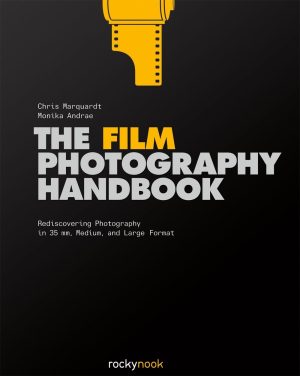The Film Photography Handbook
Rediscovering Photography in 35mm, Medium, and Large Format

This book is intended for anyone who is curious about film and analog photography, whether you need a refresher course or are discovering this wonderful format for the first time. You’ll learn how easy it is to shoot and process black-and-white film at home, and that just a little special equipment is needed to get into film photography.
You’ll learn all about:
- The important differences between film and digital photography
- Numerous film cameras, as well as how to buy a second-hand camera
- Film formats, from 35 mm to medium format and large format
- Exposure settings, tonal values, and tonal representations in different types of film, from color negatives and slides to the enormous spectrum of black-and-white films
- Processing film, covering everything you need to know: equipment, chemicals, and workflow
- Scanning negatives to bring your analog photography into a digital workflow
- Both presenting and archiving your prints and negatives
In this updated and expanded edition, Chris Marquardt and Monika Andrae included topics such as the hybrid film/digital workflow, the digitization of negatives, and using smartphones for light metering and to assist in film processing.
Contents
Why Film Photography?
- Enjoying the Process
- Too Many Options Make You Unhappy
Analog or Digital?
- Film Grain
- Arrangement
- Sharpness
- Area
- Contrast Range
- Angle of Light
- The Bayer Pattern
- Banding
- White Balance vsFilm Type
- Further Processing
Cameras and Film Formats
- 35mm
- The Film
- Rangefinder
- Single Lens Reflex Camera (SLR)
- Medium Format: 6×6, 6×7, and 6×9
- Film Types
- Image Formats
- Camera Types
- Large Format: 4×5”
- Large Format Cameras
- Film and Film Holders
- Camera Movement
- Tips on Buying a Camera
- Light Seals
- Shutters
- Lenses
Exposure
- Stops
- F-Numbers
- Light Metering
- Reflective Metering
- Incident Metering
- Without Light Meter
- Sunny 16
- With Light Meter
- Handheld Light Meter
- Smartphone
- Digicam & Gray Card
- Professional Light Meter
- Light Metering with the Zone System
Film
- Black-and-White Film
- From Color to Black-and-White
- Orthochromatic Film
- Panchromatic Film
- Infrared (IR) Film
- Infrared (IR) Film with Aura Effect
- Color Filters
- Color Film
- Color Negative Film
- Slide Film
- Other Types of Film
- Instant Film
- ISO—The Film Speed
In the Laboratory
- Industrial Laboratory
- Professional Laboratory
- Processing Yourself: Black-and-White
- Overview: Negative Processing
- Chemicals
- Hardware
- General Procedure for Film Processing
- Troubleshooting
- Digital Helpers
- Community
- Push and Pull
- Processing Yourself: Color
- The Press Kit
- Temperatures
- Useful Accessories
Post-Processing
- Traditional
- Hybrid Analog/Digital
- Scanner Types
- Scanner Parameters
- Scanning Software
- Scanner Profiling
- Accessories
- The Scanning Process
- Digital Printing
- Having Photos Printed: By a Discounter
- Having Photos Printed: At a Professional Lab
- Printing Photos Yourself
- High-End Ink Jet Prints
- Profiling
- Printing Workflow
- Historical Processes
- Cyanotype
- Albumen Print
Presentation
- Mats
- It’s All About the Right Size
- Frames
- Mounting Techniques
- Matting
- Mounting
Storage and Archiving
- General Considerations
- Storing Negatives
- Prints
- A Tidy House, A Tidy Mind
Fun with “Planned Accidents”
- Cameras and Optics
- The Box Camera
- Diana, Holga, and Other Toy Cameras
- The Pinhole Camera
- The Subjektiv
- Zone Plate
- Lensbaby
- Expired Film
- Experimenting is Fun
- Film Speed and Light Conditions
- The Special Joys of Cross Processing
- A Residual Risk Always Remains
- Treated Film
- Double and Multiple Exposure
